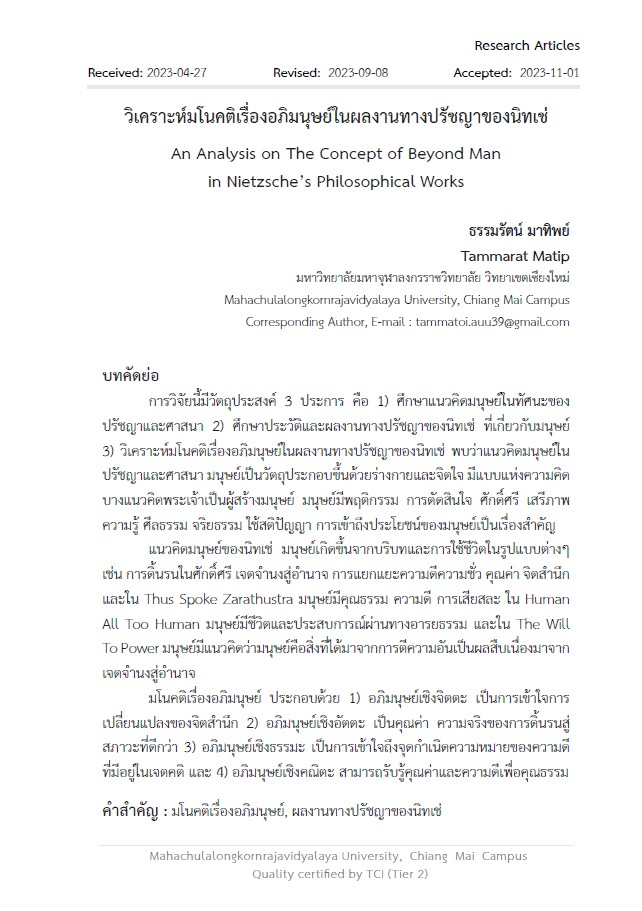An Analysis on The Concept of Beyond Man in Nietzsche’s Philosophical Works
Main Article Content
Abstract
This research article has 3 objectives as follows: (1) study the concept of human beings in the viewpoint of philosophy and religion (2) to study the history and philosophical works of Nietzsche. (3) Analyze the concept of beyond man in Nietzsche's philosophical works.
Found that Human Concepts in Philosophy and Religion Man is an object made up of body and mind. have a pattern of thought Some ideas God is the creator of man. Human behaviour, decision-making, dignity, freedom, knowledge, morality, ethics, intelligence, access to human benefits is important.
Nietzsche's concept of humans, Human beings arise from different contexts and lifestyles, such as striving for dignity. will to power Discrimination of good and evil, value, consciousness, and in Thus Spoke Zarathustra, human beings have virtue, goodness, sacrifice. In Human All Too Human, human beings live and experience through civilization. And in The Will To Power, man is conceptualized that man is what is derived from the consequential interpretation of will to power.
Concepts of Beyond manism include: (1) Spiritual beyond man in the spirit It is understanding the transformation of consciousness. (2) Ego meta beyond man is the true value of striving for a better state. (3) Dharma meta beyond man it is an understanding of the origin of the meaning of goodness in the attitude. (4) Mathematical beyond man able to recognize the value and goodness for virtue.
Article Details
References
กีรติ บุญเจือ. (2547). นีทเฉอ ผู้บุกเบิกแนวคิดหลังนวยุค ด้วยวิถีสู่อภิมนุษย์และซึ้งสุนทรีย์. กรุงเทพมหานคร: อักษรเจริญทัศน์.
ชาตรี ชุมเสน. (2551). จริยธรรมกับชีวิต. สำนักวิชาศึกษาทั่วไป: มหาวิทยาลัยราชภัฏอุดรธานี.
พระมหาปพน กตสาโร (แสงย้อย). (2561). การวิเคราะห์อภิปรัชญาที่ปรากฏในสารัตถะแห่งคัมภีร์มิลินทปัญหา. พุทธศาสตรดุษฎีนิพนธ์ คณะพุทธศาสตร์ มหาวิทยาลัยมหาจุฬาลงกรณราชวิทยาลัย.
ฟรีดิริช วิลเฮล์ม นีทเช่: อัคนี มูลเมฆ แปล. (2550). ซาราธุสตราตรัสไว้ดังนี้. กรุงเทพมหานคร: โฆษิต.
วิทย์ วิศทเวทย์. (2564). ปรัชญาทั่วไป. กรุงเทพมหานคร: โครงการเผยแพร่ผลงานทางวิชาการ คณะอักษรศาสตร์ จุฬาลงกรณ์มหาวิทยาลัย.
สมาคมคริสตธรรมในประเทศไทย. (2514). ไบเบิ้นพระคริสคัมภีร์ภาคพันธสัญญาเดิม. กรุงเทพมหานคร: สมาคมคริสตธรรมในประเทศไทย.
สุภาสรณ์ โกสีย์. (ม.ป.ป.). ปรัชญาทั่วไป. สงขลา: คณะศิลปะศาสตร์และศึกษาศาสตร์ มหาวิทยาลัยหาดใหญ่.
Christopher Frank Silver. (2013). ATHEISM, AGNOSTICISM, AND NONBELIEF: A QUALITATIVE AND QUANTITATIVE STUDY OF TYPE AND NARRATIVE,. USA: University of Tennessee.
Friedrich Wilhelm Nietzsche. (2006). Thus Spoke Zarathustra. Tr. by Adraian Del Caro. England: Cambridge University.
___________. (1910). Human All Too Human. Tr. by Helen Zimmern. LONDON: Printed by Morrison & GibbLimited Edinburgh.
___________. (1968). The Will To Power. Tr. by WALTER KAUFMANN and R. J. HOLLINGDALE. NewYork: ADIVISION OF RANDOM HOUSE.
Helen Tattam. (2007). EXISTENTIALIST ETHICAL THOUGHT IN THE THEATRE OF GABRIEL MARCEL, ALBERT CAMUS, AND JEAN-PAUL SARTRE,. UK: University of Nottingham.
Keith Ansell Pearson. (2006). A Companion to Nietzsche. UK: Blackwell Publishing Ltd.
M. K. GANDHI. (1996). THE ESSENCE OF HINDUISM. INDIA: NAVAJIVAN PUBLISHING HOUSE AHMEDABAD.
MAURICE CORNFORTH. (1978). Materialism and the Dialectical Method. NEW YORK: INTERNATIONAL PUBLISHEM.
Mykola Popovych et al. (2021). Introducing the concepts and methods of humanism into education for ensuring quality sustainable development. Republic of Korea: E3S Web of Conferences 277.
Reviewed by Olle Häggström. (2007). Irreligion. Notices of the AMS. 55 (7), 790.
ROSI BRAIDOTTI. (2013). Posthuman Humanities. European Educational Research Journal. 12 (1), 1-2.
STEPHEN MAITZEN. (2019). Normative Objections to Theism. United Kingdom: John Wiley & Sons Ltd.
Venerable Nārada Mahāthera. (1998). The Buddha and His Teachings. TAIWAN: The Corporate Body of the Buddha Educational Foundation Taipei.
W. Russ Payne. (2015). An Introduction to Philosophy. USA: Bellevue College.


